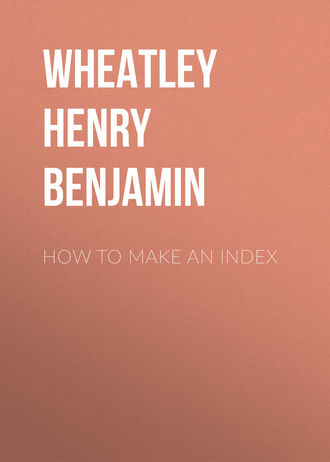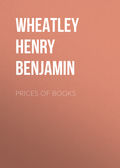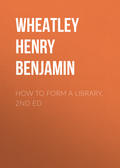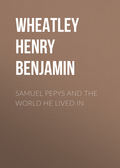
Wheatley Henry Benjamin
How to Make an Index
There is a great deal to arrange in preparing for the press. Lines of repetition are often a source of blundering, specimens of which have already been given.
The dash should not be too long, and very often space is saved and greater clearness is obtained by putting the general heading on a line by itself, and slightly indenting the following entries.
Black type for headings and for the references to volume and page add much to the clearness of an index, but some persons have a decided objection to the spottiness that is thus given to the page.
Tastes differ so much in respect to printing that it is not possible to indicate the best style to be adopted, and so each must choose for himself. One point, however, is of the greatest importance, and that is where a heading is continued over leaf it should be repeated with the addition of continued at the end of the heading. It is not unusual in such cases to see the dash used at the top of the page, which is absurd.
When the index has been put into print, the indexer has still to correct the press, and this is not always an easy matter, as the printer is scarcely likely to have understood all the necessarily elaborate and complicated marks used in preparing for the press. It will therefore still be some time before the end is in sight, and probably the indexer will see cause to agree with my statement on a former page, that in the case of a large index, when the indexing of the book itself is completed, little more than half of the total work is done.
CHAPTER VIII.
General or Universal Index
"When Baillet, the learned author of the Jugemens des Savans, was appointed by M. de Lamoignon keeper of the exquisite library collected by that nobleman, he set to work to compile an index of the contents of all the books contained in it, and this he is said to have completed in August, 1682. After this date, however, the Index continued to grow, and it extended to thirty-two folio volumes, all written by Baillet's own hand."
AS knowledge increases and books and magazines gather in number, the need for many indexes becomes daily more evident. We often are certain that something has been written on a subject in which we are interested, but in vain we seek for a clue to it. We want a key to all this ever-increasing literature.
As long ago as 1842 the late Thomas Watts, of the British Museum, one of the most learned and all-knowing of librarians, spoke to the late Dr. Greenhill of Hastings on the need for the formation of an Index Society. This date I give on the authority of Dr. Greenhill. Mr. Watts was a perfect index in himself, and few inquirers sought information from him which his fully stored mind was not able to supply; and he was not jealous of the printed index, as some authorities are. Twelve years after—in 1854—an announcement was made in Notes and Queries of the projected formation of a "Society for the Formation of a General Literary Index." In the 2nd Series, vol. i., p. 486, the late Mr. Thomas Jones, who signed himself "Bibliothecar. Chetham.," commenced a series of articles, which he continued for several years, as a contribution to this general index; but nothing more was heard of the society. Inquiries were made in various numbers of Notes and Queries, but no response was obtained. In 1876 a contributor to the same periodical, signing himself "A. H.," proposed the formation of a staff of index compilers. In 1874 the late Professor Stanley Jevons published his Principles of Science. In the chapter on Classification he enlarged on the value of indexes, and added:
"The time will perhaps come when our views upon this subject will be extended, and either Government or some public society will undertake the systematic cataloguing and indexing of masses of historical and scientific information, which are now almost closed against inquiry" (1st ed., vol. ii., p. 405; 2nd ed., p. 718).
In the following year Mr. Edward Solly and I, without having then seen this passage, consulted as to the possibility of starting an Index Society, but postponed the actual carrying out of the scheme for a time. In July of this same year, 1875, Mr. J. Ashton Cross argued in a pamphlet that a universal index might be formed by co-operation through a clearing-house, and would pay if published in separate parts. In September, 1877, some letters by Mr. W. J. Thoms, who signed himself "A Lover of Indexes," were published in the Pall Mall Gazette, in which the foundation of an Index Society was strongly urged. In October, 1877, Mr. Cross read a paper before the Conference of Librarians, which was a revival of the scheme previously suggested. Mr. Robert Harrison, late Secretary of the London Library, in a report of the Conference of Librarians published in the Athenæum for October 13th, 1877, wrote:
"Could not a permanent Index Society be founded with the support of voluntary contributions of money as well as of subject matter? In this way a regular staff could be set to work, under competent direction, and could be kept steadily at work until its performances became so generally known and so useful as to enable it to stand alone and be self-supporting. Many readers would readily jot down the name of any new subject they met with in the book before them, and the page on which it occurs, and forward their notes to be sorted and arranged by any society that would undertake the work."
Mr. Justin Winsor, the late distinguished librarian of Harvard University, writing to the Athenæum, said:
"We have been in America striving for years to get some organised body to undertake this very work."
Following on all this correspondence, the Index Society was founded; but after doing some useful work it was amalgamated with the Index Library founded by Mr. Phillimore, having failed from want of popular support. This want of permanent success was probably owing to its aim being too general. Those who were interested in one class of index cared little for indexes which were quite different in subject.
I fear that the interest of the public in the production of indexes (which is considerable) does not go to the length of willingness to pay for these indexes, which from the fewness of those who care for these helps must always be expensive. When suggestions were made in Notes and Queries for the compilation and publication of certain needed indexes, Mr. J. Cuthbert Welch wrote that the editor of a journal offered to publish an index if he could obtain sufficient subscribers. Respecting this offer, the publisher said, "Altogether I had six offers to take one copy each." This rebuff caused Mr. Welch to say, "Is it not rather that people are not energetic to buy such indexes than that publishers are not energetic enough to issue them?"25
There is still a great want for indexes of history and biography, and it is probable that if the objects of the Index Society had been confined to these it might have been more successful. In November, 1878, Mr. Edward Solly wrote a letter to me in which he sketched out a very important scheme for a biographical index which would be of the greatest value. He wrote:
"I do not think the Index Society can take up any subject of greater utility, or one more likely to be of service to the general public as well as students, than an Index of Biographies. An entire index of all known lives would obviously be much too large an undertaking; we can only attempt a part of the subject. Probably in the first instance we should do well to try and form an index of British lives; such a work would I think, if tolerably complete, certainly fill at least ten large octavo volumes.
"The work might be considerably diminished in bulk if we were to determine to leave out all names now to be found in certain standard works such as Chalmers' Biographical Dictionary. It is evident, however, that to do this would greatly diminish the value of our index, and would cause us to put aside hundreds of memoranda which it is most important to index, I mean references to more recent notes, memoirs, letters and anecdotes, which are to be met with in journals and lives, and which often throw new and important light on older published Biographies.
"It is on account of these difficulties that I would propose that we endeavour to undertake an index of Biographical references of persons who have died in a certain given period—say 1800-1825, or 1800-1850, or perhaps 1750-1800.
"With a view to this I should like to see lists made of all Biographical matters in such books as the Gentleman's Magazine, European Magazine, Monthly Magazine, Anti-Jacobin Magazine, etc. Also such books as the Annual Necrology, Public Characters, Living Authors, etc., and thirdly of references to Biographical Memoranda dispersed throughout Lives and Memoirs such as 'Kilvert's Memoirs,' I mean books in which no one from the title would expect to find such information."
It will be seen that such an index as is here sketched would be an inestimable help to the student. It would form a useful supplement to the Dictionary of National Biography, for it must be remembered that such an index would contain a majority of references to men and women whose claims to distinction or notoriety do not attain to the standard set up by the promoters of that grand work. Possibly, if such an index was undertaken by co-operation as an object in itself, and not as one among other subjects, it might be compiled in one alphabet instead of in periods, which would make it much more valuable for reference. Naturally the great advantage of periods is that, if left incomplete, what is published (if it covers a period) will always be of value, while a portion of the alphabet would be almost worthless.
The Rev. John E. B. Mayor has collected a great mass of biographical references which are of much value. In an interesting communication on his indexes he suggests the formation of a British Biographical Society which might be called the Antony Wood Society.26
There is one project of the Index Society which has never been undertaken, but which is still wanted as much as ever—viz. a general or universal index. Some think this to be an impossibility, and that to attempt its preparation is a waste of time. Those who hold this opinion have not sufficient faith in the simplicity and usefulness of the alphabet. Every one has notes and references of some kind, which are useless if kept unarranged, but, if sorted into alphabetical order, become valuable.
The object of the general index is just this, that anything, however disconnected, can be placed there, and much that would otherwise be lost will there find a resting-place. Always growing and never pretending to be complete, the index will be useful to all, and its consulters will be sure to find something worth their trouble, if not all they may require.
Some attempts have been made at compiling a general index, for what are Poole's Index, Index of Essays, Q.P. Indexes, Hetherington's Index to the Periodicals of the World, and Indexes to "The Times," but contributions towards a universal index? Such a work as is here proposed can scarcely be carried out unless Government aid is extended to it; but surely the small amount of money that need be expended upon a sort of general inquiry office would be well laid out!
A sort of skeleton index of universal information might be drawn up, and this could be added to gradually, partly by specialised effort and partly by the reception of any stray references of interest sent by those who recognise that their notes would find a home. This could be kept in a clearing-house and reference-room.
When the index had become of some importance, and was recognised as a help to the inquirer, it could be printed. When published, it might be interleaved, so that additions might be made which could be sent to the office. Gradually the index would grow into a work of very considerable importance.
One of the chief objections to index catalogues of public libraries is that the same work is practically repeated by each library, while a general index would be useful to all. Surely some arrangement might be made by which the various libraries would contribute funds to the central office and receive the indexes, which would serve their purpose as well as those of all the other libraries!
Having said so much, it seems necessary to explain rather more fully what the general index should contain and what should be omitted. To explain it in a few words, it should be a sort of encyclopædia of references rather than of direct information; but it should contain more headings than any existing encyclopædia. Every one must have felt the want of some book which would give information or references on a large number of subjects that are constantly topics of ordinary conversation, but are consistently ignored in the ordinary books of reference. On the other hand, mere technical references should be omitted, because these details would overload the work, and because specialists have their own sources of information. It is the general information which every one is supposed to possess that is so difficult to obtain.
In the first instance the groundwork of the index should be laid down with care by an expert. All special bibliographies should be entered under their subjects, both those published separately and those included in other books. Various societies have published indexes. There are those among the publications of the Index Society and many others. The Bibliographical Society has published indexes to the German periodical Serapeum and to Dibdin's edition of Ames' and Herbert's Typographical Antiquities; but very few persons know of these books.
The authorities of the British Museum have given students an immense help by gathering separate indexes and bibliographies on various subjects into the dwarf bookcases in the Reading-room. Here are a large number of aids to knowledge of which the general reader would have known nothing if they had not so obligingly been brought under his notice.27
A large number of books contain special information of importance on various subjects, the existence of which would never be guessed from the titles. Attempts at general indexes of special subjects have been published, such as F. S. Thomas's Historical Notes (1509-1714), and the main points of these should be included in the proposed General Index.
When a good groundwork has been made, the index could be printed; and doubtless, if this printed index was widely circulated, a large number of helpers would speedily be found. Many persons know of places where full information on some subject may be found, and would be glad to place their collections where they would be helpful to others.
There can surely be no doubt that a general inquiry office with such an ever-growing index and a library of printed indexes would be a boon not only to the student, but to the general public. Every day the great truth that keys to knowledge are more and more required is generally appreciated.
As a groundwork for such a general index, selection could be made from the books already mentioned; and from the index volumes of Watt's Bibliotheca Britannica (1824), which, with all its faults, is one of the most valuable helps to bibliography, and the subject index of James Darling's Cyclopædia Bibliographica (1854-1859), many useful references could be obtained. These two books are gradually getting out of date, but information may be obtained from their pages which is not easily to be obtained elsewhere.
In closing this subject, I feel that too great honour cannot be done to the memory of W. F. Poole, who placed the world under great obligations by the production of his Index of Periodical Literature. As far back as 1848, when a student at Yale College, he published an Index to Subjects treated in the Reviews and other Periodicals (New York). In 1853 an improved edition was published as the Index to Periodical Literature. When Mr. Poole attended the Library Conference at London in 1877 he expressed publicly his pleasure in seeing on the shelves of the British Museum Library a copy of his first index, which he had not seen for some years elsewhere. He realised that the work, if it were to be continued, was too great an undertaking for one man, and he succeeded in arranging for a co-operative index, which is continued now in several supplements under the able superintendence of Mr. William I. Fletcher.
An Index to the "Times" was started by J. Giddings in 1862-63, but not continued. Later, Mr. S. Palmer commenced a Quarterly Index, which has been continued forward to the present time, and also backward. In 1899 Bailey's Annual Index to the "Times" came into being.
The indexing of a paper such as the Times is a very arduous and difficult undertaking. In consequence, these indexes cannot be considered as models of what such works should be.
Mr. Corrie Leonard Thompson criticises in Notes and Queries (7th S., x. 345) the arrangement of the headings of Palmer's Index to the "Times" severely, but not unfairly. He writes:
"The following are instances of the absurdities which appear in the volume just issued (Oct.-Dec. 1842), and will serve to illustrate the system which has been adopted throughout the index:"In November, 1842, a floating chapel on the Severn was loosed from its moorings; this occurrence appears in the index under the heading, 'Disgraceful Act.' Again, referring to the dry weather that was prevailing at the time, the entry is, 'Present Dry Season.' Other references to the same subject are, however, to be found under the heading 'Weather,' which of course is correct."A more marked example of carelessness or ignorance of the art of indexing, or both, is that of two women who were committed to Ruthin prison—one, Amelia Home for firing a pistol at a man named Roberts; the other, Jane Williams, for stealing a mare belonging to Robert Owen. This occurrence is entered under the letter R—'Rather uncommon for Females.' The chance of any one looking under Rather for an occurrence of this kind must be infinitesimal, to say the least of it; and so on. A storm at Saone-et-Loire is indexed under 'Fatal Storm,' and an account of the trial of a small boy for stealing a twopenny pie will be found under 'Atrocious Criminal.' A certain Jane Thomas was so overjoyed at seeing her mother waiting at the stage-door of a theatre that she died in her arms. The employment of capitals is most remarkable, as is also the arrangement of the words, 'Death of Jane Thomas in her Mother's Arms in Holborn at Joy in Seeing her parent at the Stage Door to Receive her.'"The errors pointed out in these examples, omitting the last instance, as well as the additional fault of indexing under adjectives which have no distinctive feature in them to guide the searcher, evidently arise from the fact that the simple heading of the newspaper article has been taken, without any attempt being made to discover the actual contents of such article."
As already stated on a previous page, it is most important to index the articles in periodicals afresh, and not always to follow the heading of the original. This is of course more particularly the case in respect to newspapers, where the headings are drawn up to catch the reader's eye. The same rule may be insisted on in respect to all indexing, and this is so important that the restatement of it may well conclude this little volume.In making a general index of several volumes, always index the volumes afresh, and do not be contented with using what has been done before. It is always wiser to put 'new wine into new bottles.'






